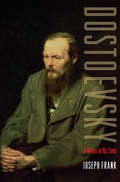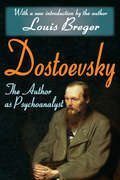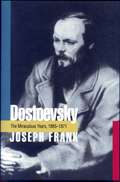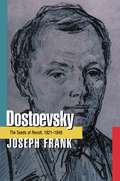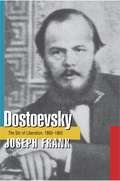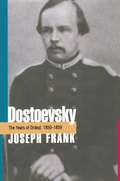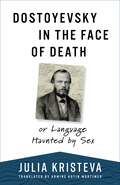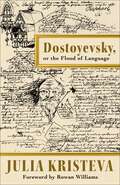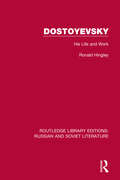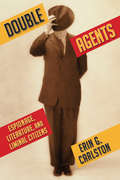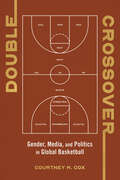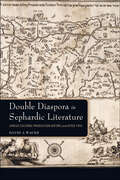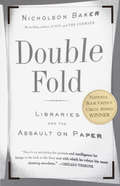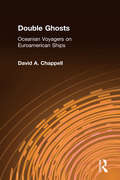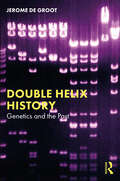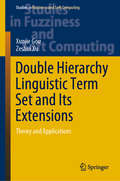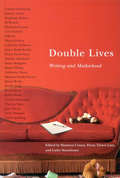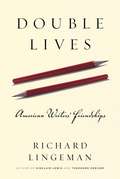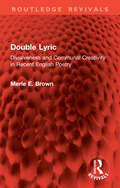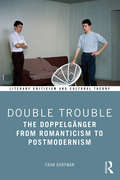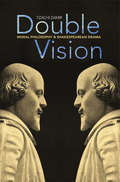- Table View
- List View
Dostoevsky: A Writer in His Time
by Joseph FrankA magnificent one-volume abridgement of one of the greatest literary biographies of our timeJoseph Frank's award-winning, five-volume Dostoevsky is widely recognized as the best biography of the writer in any language—and one of the greatest literary biographies of the past half-century. Now Frank's monumental, 2,500-page work has been skillfully abridged and condensed in this single, highly readable volume with a new preface by the author. Carefully preserving the original work's acclaimed narrative style and combination of biography, intellectual history, and literary criticism, Dostoevsky: A Writer in His Time illuminates the writer's works—from his first novel Poor Folk to Crime and Punishment and The Brothers Karamazov—by setting them in their personal, historical, and above all ideological context. More than a biography in the usual sense, this is a cultural history of nineteenth-century Russia, providing both a rich picture of the world in which Dostoevsky lived and a major reinterpretation of his life and work.
Dostoevsky: The Author as Psychoanalyst
by George SantayanaAndre Gide once said that Feodor Dostoevsky "lost himself in the characters of his books, and, for this reason, it is in them that he can be found again." In "Dostoevsky: The Author as Psychoanalyst", Louis Breger approaches Dostoevsky psychoanalytically, not as a "patient" to be analyzed, but as a fellow psychoanalyst, someone whose life and fiction are intertwined in the process of literary self-exploration.Raskolnikov's dream of the suffering horse in "Crime and Punishment" has become one of the best known in all literature, its rich imagery expressing meaning on many levels. Using this as a starting point, Breger goes on to offer a detailed analysis of the novel, situating it at the pivotal point in Dostoevsky's life between the death of his first wife and his second marriage. Using insights from his psychological training, Breger also explores other works by Dostoevsky, among them his early novel, "The Double", which Breger relates to the nervous breakdown that Dostoevsky suffered in his twenties, as well as "Notes from Underground", "The Possessed", "The Idiot", "The Brothers Karamazov", and so forth. Additionally, details from Dostoevsky's own life - his compulsive gambling, his epilepsy, his philosophical, political, religious, and mystical beliefs, and the interpretations of them found in existing biographies - are analyzed in detail.
Dostoevsky: The Miraculous Years, 1865-1871
by Joseph FrankThis volume, the fourth of five planned in Joseph Frank's widely acclaimed biography of Dostoevsky, covers the six most remarkably productive years in the novelist's entire career. It was in this short span of time that Dostoevsky produced three of his greatest novels--Crime and Punishment, The Idiot, and The Devils--and two of his best novellas, The Gambler and The Eternal Husband. All these masterpieces were written in the midst of harrowing practical and economic circumstances, as Dostoevsky moved from place to place, frequently giving way to his passion for roulette. Having remarried and fled from Russia to escape importuning creditors and grasping dependents, he could not return for fear of being thrown into debtor's prison. He and his young bride, who twice made him a father, lived obscurely and penuriously in Switzerland, Germany, and Italy, as he toiled away at his writing, their only source of income. All the while, he worried that his recurrent epileptic attacks were impairing his literary capacities. His enforced exile intensified not only his love for his native land but also his abhorrence of the doctrines of Russian Nihilism--which he saw as an alien European importation infecting the Russian psyche. Two novels of this period were thus an attempt to conjure this looming spectre of moral-social disintegration, while The Idiot offered an image of Dostoevsky's conception of the Russian Christian ideal that he hoped would take its place.
Dostoevsky: The Seeds of Revolt, 1821-1849
by Joseph FrankThe term "biography" seems insufficiently capacious to describe the singular achievement of Joseph Frank's five-volume study of the life of the great Russian novelist Fyodor Dostoevsky. One critic, writing upon the publication of the final volume, casually tagged the series as the ultimate work on Dostoevsky "in any language, and quite possibly forever." Frank himself had not originally intended to undertake such a massive work. The endeavor began in the early 1960s as an exploration of Dostoevsky's fiction, but it later became apparent to Frank that a deeper appreciation of the fiction would require a more ambitious engagement with the writer's life, directly caught up as Dostoevsky was with the cultural and political movements of mid- and late-nineteenth-century Russia. Already in his forties, Frank undertook to learn Russian and embarked on what would become a five-volume work comprising more than 2,500 pages. The result is an intellectual history of nineteenth-century Russia, with Dostoevsky's mind as a refracting prism.The volumes have won numerous prizes, among them the National Book Critics Circle Award for Biography, the Christian Gauss Award of Phi Beta Kappa, the Los Angeles Times Book Prize, and the James Russell Lowell Prize of the Modern Language Association.
Dostoevsky: The Stir of Liberation, 1860-1865
by Joseph FrankThe book description for the previously published "Dostoevsky: The Stir of Liberation, 1860-1865" is not yet available.
Dostoevsky: The Years of Ordeal, 1850-1859
by Joseph FrankThe description for this book, Dostoevsky: The Years of Ordeal, 1850-1859, will be forthcoming.
Dostoyevsky in the Face of Death: or Language Haunted by Sex (European Perspectives: A Series in Social Thought and Cultural Criticism)
by Julia KristevaJulia Kristeva has been both attracted and repelled by Dostoyevsky since her youth. In this extraordinary book, by turns poetic and intensely personal, she brings her unique critical sensibility to bear on the tormented and visionary Russian author.Kristeva ranges widely across Dostoyevsky’s novels and his journalism, plunging deep into the great works—and many of the smaller ones—to investigate her fascination with the Russian author. What emerges is a luminous vision of the writer’s achievements, seen in a wholly new way through Kristeva’s distinctive perspective on language. With her keen psychoanalytical eye, she offers brilliant insights into the passionate heroines of the great novels. Focusing on Dostoyevsky’s polyphonic writing, Kristeva also demonstrates the importance of Orthodox Christianity throughout his body of work, analyzing the complex ways his carnivalesque theology informs his fiction and commentary.An original and profound interpretation of one of the nineteenth century’s greatest writers, this book’s insights are also relevant to the twentieth and twenty-first centuries—up to our unsettled present, to which Kristeva’s humane reading of the suffering Russian author brings understanding and even solace.
Dostoyevsky, or The Flood of Language (European Perspectives: A Series in Social Thought and Cultural Criticism)
by Julia KristevaGrowing up in Bulgaria, Julia Kristeva was warned by her father not to read Dostoyevsky. “Of course, and as usual,” she recalls, “I disobeyed paternal orders and plunged into Dosto. Dazzled, overwhelmed, engulfed.” Kristeva would go on to become one of the most important figures in European intellectual life—and she would return over and over again to Dostoyevsky, still haunted and enraptured by the force of his writing.In this book, Kristeva embarks on a wide-ranging and stimulating inquiry into Dostoyevsky’s work and the profound ways it has influenced her own thinking. Reading across his major novels and shorter works, Kristeva offers incandescent insights into the potent themes that draw her back to the Russian master: God, otherness, violence, eroticism, the mother, the father, language itself. Both personal and erudite, the book intermingles Kristeva’s analysis with her recollections of Dostoyevsky’s significance in different intellectual moments—the rediscovery of Bakhtin in the Thaw-era Eastern Bloc, the debates over poststructuralism in 1960s France, and today’s arguments about whether it can be said that “everything is permitted.” Brilliant and vivid, this is an essential book for admirers of both Kristeva and Dostoyevsky. It also features an illuminating foreword by Rowan Williams that reflects on the significance of Kristeva’s reading of Dostoyevsky for his own understanding of religious writing.
Dostoyevsky: His Life and Work (Routledge Library Editions: Russian and Soviet Literature #4)
by Ronald HingleyThis book, first published in 1978, demonstrates how Dostoyevsky’s novels grew directly out of the pressures of their creator’s tormented experience and personality. Ronald Hingley draws upon important fresh source material, which includes the definitive Soviet edition of Dostoyevsky’s works with drafts and variants, Soviet research on the circumstances of his father’s death, and a newly deciphered section of the diary of his second wife, Anna. Hingley considers with his analysis all Dostoyevsky’s works, the ideas they contain, their varying artistic success, and their contemporary critical reception. He convincingly present’s Dostoyevsky’s genius at its most powerful when most on the attack.
Dot's Spot (Word Family Readers:)
by Liza Charlesworth"Dot bumped into a pot and got a giant spot on her favorite top! Read all about Dot's not-so-good day in this silly story that teaches lots and lots of -ot words."
Double Agents
by Erin G CarlstonWhy were white bourgeois gay male writers so interested in spies, espionage, and treason in the twentieth century? Erin G. Carlston believes such figures and themes were critical to exploring citizenship and its limits, requirements, and possibilities in the modern Western state. Through close readings of Marcel Proust's novels, W. H. Auden's poetry, and Tony Kushner's play Angels in America, which all reference real-life espionage cases involving Jews, homosexuals, or Communists, Carlston connects gay men's fascination with spying to larger debates about the making and contestation of social identity.Carlston argues that in the modern West, a distinctive position has been assigned to those perceived to be marginal to the nation because of non-visible religious, political, or sexual differences. Because these "invisible Others" existed somewhere between the wholly alien and the fully normative, they evoked acute anxieties about the security and cohesion of the nation-state. Incorporating readings of nonliterary cultural artifacts, such as trial transcripts, into her analysis, Carlston pinpoints moments in which national self-conceptions in France, England, and the United States grew unstable. Concentrating specifically on the Dreyfus affair in France, the defections of Communist spies in the U.K., and the Rosenberg case in the United States, Carlston directly links twentieth-century tensions around citizenship to the social and political concerns of three generations of influential writers.
Double Agents: Espionage, Literature, and Liminal Citizens
by Erin CarlstonWhy were white bourgeois gay male writers so interested in spies, espionage, and treason in the twentieth century? Erin G. Carlston believes such figures and themes were critical to exploring citizenship and its limits, requirements, and possibilities in the modern Western state. Through close readings of Marcel Proust's novels, W. H. Auden's poetry, and Tony Kushner's play Angels in America, which all reference real-life espionaage cases involving Jews, homosexuals, or Communists, Carlston connects gay men's fascination with spying to larger debates about the making and contestation of social identity. Carlston argues that in the modern West, a distinctive position has been assigned to those perceived to be marginal to the nation because of non-visible religious, political, or sexual differences. Because these "invisible Others" existed somewhere between the wholly alien and the fully normative, they evoked acute anxieties about the security and cohesion of the nation-state. Incorporating readings of nonliterary cultural artifacts, such as trial transcripts, into her analysis, Carlston pinpoints moments in which national self-conceptions in France, England, and the United States grew unstable. Concentrating specifically on the Dreyfus affair in France, the defections of Communist spies in the U.K., and the Rosenberg case in the United States, Carlston directly links twentieth-century tensions around citizenship to the social and political concerns of three generations of influential writers.
Double Agents: Espionage, Literature, and Liminal Citizens
by Erin G. CarlstonWhy were white bourgeois gay male writers so interested in spies, espionage, and treason in the twentieth century? Erin G. Carlston believes such figures and themes were critical to exploring citizenship and its limits, requirements, and possibilities in the modern Western state. Through close readings of Marcel Proust's novels, W. H. Auden's poetry, and Tony Kushner's play Angels in America, which all reference real-life espionaage cases involving Jews, homosexuals, or Communists, Carlston connects gay men's fascination with spying to larger debates about the making and contestation of social identity. Carlston argues that in the modern West, a distinctive position has been assigned to those perceived to be marginal to the nation because of non-visible religious, political, or sexual differences. Because these "invisible Others" existed somewhere between the wholly alien and the fully normative, they evoked acute anxieties about the security and cohesion of the nation-state. Incorporating readings of nonliterary cultural artifacts, such as trial transcripts, into her analysis, Carlston pinpoints moments in which national self-conceptions in France, England, and the United States grew unstable. Concentrating specifically on the Dreyfus affair in France, the defections of Communist spies in the U.K., and the Rosenberg case in the United States, Carlston directly links twentieth-century tensions around citizenship to the social and political concerns of three generations of influential writers.
Double Crossover: Gender, Media, and Politics in Global Basketball (Studies in Sports Media)
by Courtney M. CoxAs they compete in leagues around the world, elite women’s basketball players continually adjust to new cultures, rules, and contracts. Courtney M. Cox follows athletes, coaches, journalists, and advocates of women’s basketball as they pursue careers within the sport. Despite all attempts to contain them or prevent forward momentum, they circumvent expectations and open new possibilities within and outside of the game. Throughout the book, Cox explores the intersection of race and gender against the backdrop of the WNBA, NCAA, and other leagues within the United States and around the world. Blending interviews and participant observation with content analysis, she charts how athletes and advocates of women’s hoops illuminate new forms of navigating the global sports-media complex. Timely and original, Double Crossover takes readers into the lived world of women’s basketball to shed light on the struggles, triumphs, and contributions of today’s players and those around them.
Double Diaspora in Sephardic Literature: Jewish Cultural Production Before and After 1492 (Sephardi and Mizrahi Studies)
by David A. WacksThe year 1492 has long divided the study of Sephardic culture into two distinct periods, before and after the expulsion of Jews from Spain. David A. Wacks examines the works of Sephardic writers from the 13th to the 16th centuries and shows that this literature was shaped by two interwoven experiences of diaspora: first from the Biblical homeland Zion and later from the ancestral hostland, Sefarad. Jewish in Spain and Spanish abroad, these writers negotiated Jewish, Spanish, and diasporic idioms to produce a uniquely Sephardic perspective. Wacks brings Diaspora Studies into dialogue with medieval and early modern Sephardic literature for the first time.
Double Fold
by Nicholson BakerSince the 1950s, our country's greatest libraries have, as a matter of common practice, dismantled their collections of original bound newspapers and so-called brittle books, replacing them with microfilmed copies. The marketing of the brittle-paper crisis and the real motives behind it are the subject of this passionately argued book, in which Nicholson Barker pleads the case for saving our recorded heritage in its original form while telling the story of how and why our greatest research libraries betrayed the public trust by auctioning off or pulping irreplaceable collections. The players include the Library of Congress, the CIA, NASA, microfilm lobbyists, newspaper dealers, and a colorful array of librarians and digital futurists, as well as Baker himself -- who eventually discovers that the only way to save one important newspaper is to buy it. Double Fold is an intense, brilliantly worded narrative that is sure to provoke discussion and controversy.
Double Ghosts: Oceanian Voyagers on Euroamerican Ships
by David A. ChappellThis narrative recounts the 18th and 19th century shipping out of Pacific islanders aboard European and American vessels, a kind of counter-exploring, that echoed the ancient voyages of settlement of their island ancestors.
Double Helix History: Genetics and the Past
by Jerome De GrootDouble Helix History examines the interface between genetics and history in order to investigate the plausibility of ‘new’ knowledge derived from scientific methods and to reflect upon what it might mean for the practice of history. Since the mapping of the human genome in 2001, there has been an expansion in the use of genetic information for historical investigation. Geneticists are confident that this has changed the way we know the past. This book considers the practicalities and implications of this seemingly new way of understanding the human past using genetics. It provides the first sustained engagement with these so-called ‘genomic histories’. The book investigates the ways that genetic awareness and practice is seemingly changing historical practice and conceptualisation. Linking six concepts – ‘Public’, ‘Practice’, ‘Ethics’, ‘Politics’, ‘Self’, and ‘Imagination – Double Helix History outlines the ways that genetic information, being postgenomic, the public life of DNA, and the genetic historical imaginary work on the body, on collective memory, on the historical imagination, on the ethics of historical investigation, on the articulation of history, and on the collection and interpretation of data regarding the ‘past’. This book will appeal to researchers and students alike interested in DNA, genetics, and historiography.
Double Hierarchy Linguistic Term Set and Its Extensions: Theory and Applications (Studies in Fuzziness and Soft Computing #396)
by Zeshui Xu Xunjie GouThis book presents the concept of the double hierarchy linguistic term set and its extensions, which can deal with dynamic and complex decision-making problems. With the rapid development of science and technology and the acceleration of information updating, the complexity of decision-making problems has become increasingly obvious. This book provides a comprehensive and systematic introduction to the latest research in the field, including measurement methods, consistency methods, group consensus and large-scale group consensus decision-making methods, as well as their practical applications. Intended for engineers, technicians, and researchers in the fields of computer linguistics, operations research, information science, management science and engineering, it also serves as a textbook for postgraduate and senior undergraduate university students.
Double Lives
by Shannon CowanWriting is intellectual, solitary work, and mothering too often seen as its antithesis. Marni Jackson's The Mother Zone, published in 1992, gave many readers their first insights into the life of a mother/writer. Yet despite having writers such as Adrienne Rich, Alice Munro, Tillie Olsen and Margaret Laurence to guide and inspire them, mothers who are writers still often feel overwhelmed - even in the 21st century, a writer new to mothering may wonder if she will ever write again. In Double Lives, the first Canadian literary anthology focusing on mothering and writing, twenty-two writers, who range in reputation from seasoned professionals to noteworthy new talents, reveal the intimate challenges and private rewards of nurturing children while pursuing the passion to write. Varying widely in age, marital status, sexual orientation, culture/ethnicity, and philosophical stance, authors such as Di Brandt, Stephanie Bolster, Linda Spalding, Janice Kulyk Keefer, Sharron Proulx-Turner, Sally Ito Rachel Rose and Susan Olding, make significant and illuminating contributions to our understanding of how writer and mother co-exist.
Double Lives: American Writers' Friendships
by Richard LingemanThe rambunctious westerner Mark Twain had a deep and lasting friendship with formal, proper William Dean Howells. F. Scott Fitzgerald and Ernest Hemingway admired and reviled one another, and for years weren't on speaking terms. During her last year of life Maine author Sarah Orne Jewett was a friend and mentor to Willa Cather. This book is a collection of essays on friendships between American writers, filled with anecdotes and revelations to delight anyone who loves American literature.
Double Lives: Writing and Motherhood
by Shannon CowanWriting is intellectual, solitary work, and mothering too often seen as its antithesis. Marni Jackson's The Mother Zone, published in 1992, gave many readers their first insights into the life of a mother/writer. Yet despite having writers such as Adrienne Rich, Alice Munro, Tillie Olsen and Margaret Laurence to guide and inspire them, mothers who are writers still often feel overwhelmed - even in the 21st century, a writer new to mothering may wonder if she will ever write again. In Double Lives, the first Canadian literary anthology focusing on mothering and writing, twenty-two writers, who range in reputation from seasoned professionals to noteworthy new talents, reveal the intimate challenges and private rewards of nurturing children while pursuing the passion to write. Varying widely in age, marital status, sexual orientation, culture/ethnicity, and philosophical stance, authors such as Di Brandt, Stephanie Bolster, Linda Spalding, Janice Kulyk Keefer, Sharron Proulx-Turner, Sally Ito Rachel Rose and Susan Olding, make significant and illuminating contributions to our understanding of how writer and mother co-exist.
Double Lyric: Divisiveness and Communal Creativity in Recent English Poetry (Routledge Revivals)
by Merle E. BrownOriginally published posthumously in 1980, this book centres on 5 British poets – Geoffrey Hill, Philip Larkin, Jon Silkin, Thom Gunn and Charles Tomlinson – and on the emergence in postwar British poetry of ‘double-lyrics’, poems which have, according to the author ‘become two persons, two ways of expressing and attending critically in dramatic divisive conflict.’ The nature and significance of the double lyric is first demonstrated by close readings of Silkin’s Defence, Tomlinson’s Prometheus and Hill’s In Piam Memoriam. Further chapters focus on the impressive poems which have arisen out of the stress between ideological commitment and imaginative realization in Silkin’s work, the conflict between intuition and perception in the poetry of Tomlinson, and the split between the texture of Gunn’s language and the non-verbal experience evoked in his poems. Finally, Merle Brown presents the last phase of F. R. Leavis’ collaborative literary and cultural criticism as strikingly close to the poetic achievements of Hill, Silkin, Tomlinson and Gunn.
Double Trouble: The Doppelgänger from Romanticism to Postmodernism (Literary Criticism and Cultural Theory)
by Eran DorfmanThe double, doppelgänger, is mostly understood as a peculiar figure that emerged in nineteenth-century Romantic and gothic literature. Far from being a merely esoteric entity, however, this book argues that the double, although it mostly goes unnoticed, is a widespread phenomenon that has significant influence on our lives. It is an inherent key element of human subjectivity whose functions, forms, and effects have not yet gained the serious consideration they merit. Drawing on literature, philosophy, and psychoanalysis, and combining a personal story with theoretical interventions, Double Trouble develops a novel understanding of the double and human subjectivity in the last two centuries. It begins with the singular and narcissistic double of Romanticism and gradually moves to the multiple doubles implicated by Postmodernism. The double is what defies unicity and opens up the subject to multiplicity. Consequently, it gradually emerges as a bridge between the I and the Other, identity and difference, philosophy and literature, theory and praxis.
Double Vision: Moral Philosophy and Shakespearean Drama
by Tzachi ZamirHamlet tells Horatio that there are more things in heaven and earth than are dreamt of in his philosophy. In Double Vision, philosopher and literary critic Tzachi Zamir argues that there are more things in Hamlet than are dreamt of--or at least conceded--by most philosophers. Making an original and persuasive case for the philosophical value of literature, Zamir suggests that certain important philosophical insights can be gained only through literature. But such insights cannot be reached if literature is deployed merely as an aesthetic sugaring of a conceptual pill. Philosophical knowledge is not opposed to, but is consonant with, the literariness of literature. By focusing on the experience of reading literature as literature and not philosophy, Zamir sets a theoretical framework for a philosophically oriented literary criticism that will appeal both to philosophers and literary critics. Double Vision is concerned with the philosophical understanding induced by the aesthetic experience of literature. Literary works can function as credible philosophical arguments--not ones in which claims are conclusively demonstrated, but in which claims are made plausible. Such claims, Zamir argues, are embedded within an experiential structure that is itself a crucial dimension of knowing. Developing an account of literature's relation to knowledge, morality, and rhetoric, and advancing philosophical-literary readings of Richard III, Macbeth, Romeo and Juliet, Othello, Antony and Cleopatra, Hamlet, and King Lear, Zamir shows how his approach can open up familiar texts in surprising and rewarding ways.
